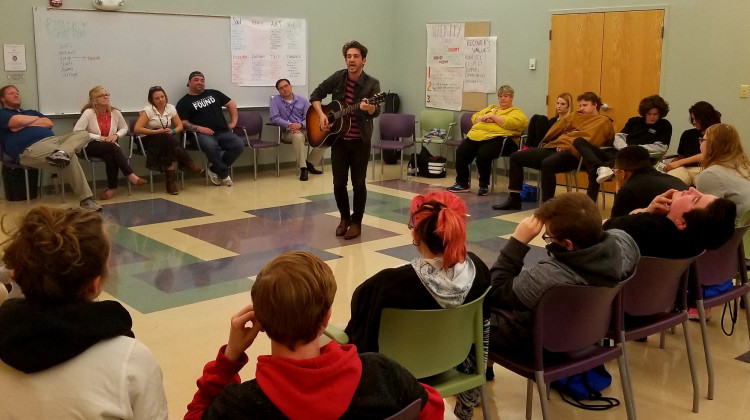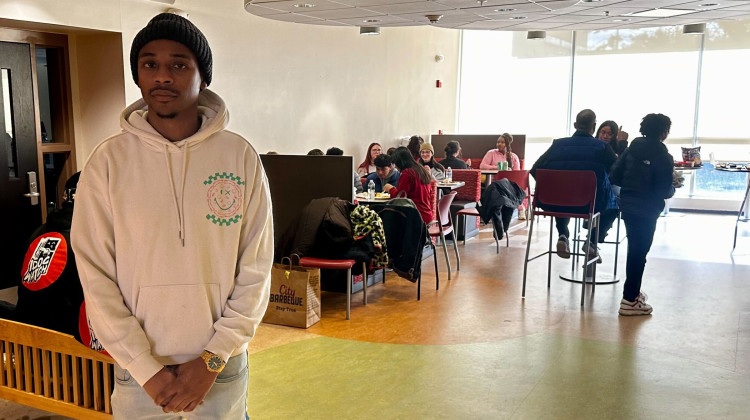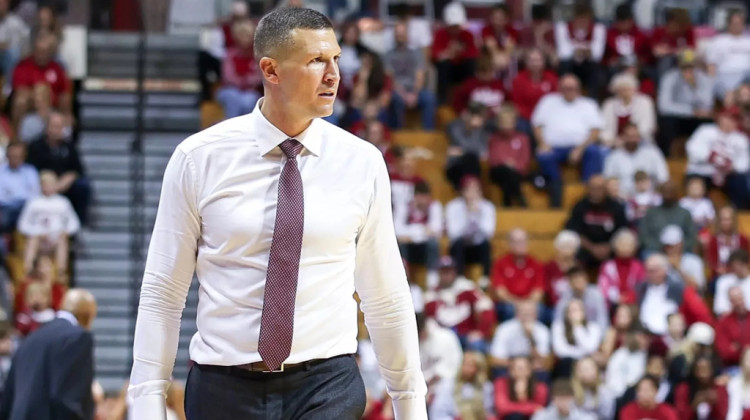
Musician Matt Butler visited Hope Academy in May 2019 to play songs and talk about his own recovery.
Hope AcademyIndiana’s only high school for students recovering from drug and alcohol addiction wants to move closer to downtown Indianapolis.
Hope Academy is seeking a new charter from the mayor’s office that would allow it to open within the Indianapolis Public Schools boundary. The school also wants to partner with the district.
The far northeast side charter school opened in 2006 in partnership with Fairbanks Hospital. It's one of just a handful of public recovery high schools in the country. A 2016 study found graduates from these type of schools are more than twice as likely to remain sober, compared to students in normal intervention programs.
Rachelle Gardner, the school’s co-founder, says Hope Academy leaders believe the move will make the school more accessible. Now, she says, some families are reluctant to attend the school because it’s on a hospital campus off of 82nd Street.
The goal of the move, she says, is to increase enrollment in underserved areas and tear down barriers that keep parents from seeking a school like Hope Academy.
“We are making a conscious effort to say, ‘How can we serve the greater Indianapolis area where distance is not a barrier,’” says Gardner. “Locating in the center of the city helps those on the north, south, east, and west get to it easier.”
More than 700 students attended the school since it opened. Students can earn a Core 40 diploma or academic honors diploma while completing recovery curriculum and counseling.
Gardner says the plan to relocate comes as the school’s current charter from the mayor’s office ends, and it moves on from its partnership with Fairbanks. Last December boards for Hope Academy and Fairbanks agreed to split in June 2020.
“Fairbanks is looking at really getting back to their core mission of treatment and recovery,” she says. “While we're able to get a stronger foothold in the education world.”
The Indianapolis Mayor’s charter school board held a hearing on the charter application Wednesday at the City-County Building. The board granted the school its first charter in 2006.
Dozens packed the room in support of the school, including former Mayor Greg Ballard. The board also praised the school’s success.
But chairman Kenneth Riggins offered a blunt assessment: “You’ve got to put your plan together a little bit better.”
Riggins and other members questioned how the school would overcome a funding gap of around $300,000 without Fairbanks’ support. The cost for a student to attend the free school is about $23,000. More than half of the funding comes from the state through per-student funding and a special budget line item for being a recovery school. Private sources cover the rest.
It currently enrolls around 37 students in grades 9 to 12. School leaders say enrollment of 60-65 students would make the school financially sustainable. The enrollment goal is 75 or more students by the 2026-27 academic year.
Gardner says Hope Academy could be an option for students at IPS or other nearby school districts who are facing expulsion for drug or alcohol use.
Ben Davis, Warren Central, and North Central high schools expelled more than 100 students each for mostly drug, and some alcohol, related issues in the past three years, according to Hope Academy data presented at the meeting.
Charter board members also questioned the racial make-up of the current Hope Academy students, who tend to be mostly white.
“The population you are serving is not Marion County,” Riggins said. “There is not a person in here who doesn’t think this is needed but the question is, how do you do it? You have to recruit more.”
In the past four years, 22 percent of students enrolled identified as non-white, according to the school’s application. In comparison, 80 percent of students at IPS schools identified as non-white in each of the past four years.
Hope Academy filed a letter of interest with IPS to become an innovation school. The special status would allow Hope Academy to operate as an independent charter school within the district and access IPS services, such as transportation and food services.
The charter school board will vote later this year on Hope Academy’s application. The school has not yet announced a proposed location in Center Township.
Contact WFYI education reporter Eric Weddle at eweddle@wfyi.org or call (317) 614-0470. Follow on Twitter: @ericweddle.
 DONATE
DONATE







 Support WFYI. We can't do it without you.
Support WFYI. We can't do it without you.